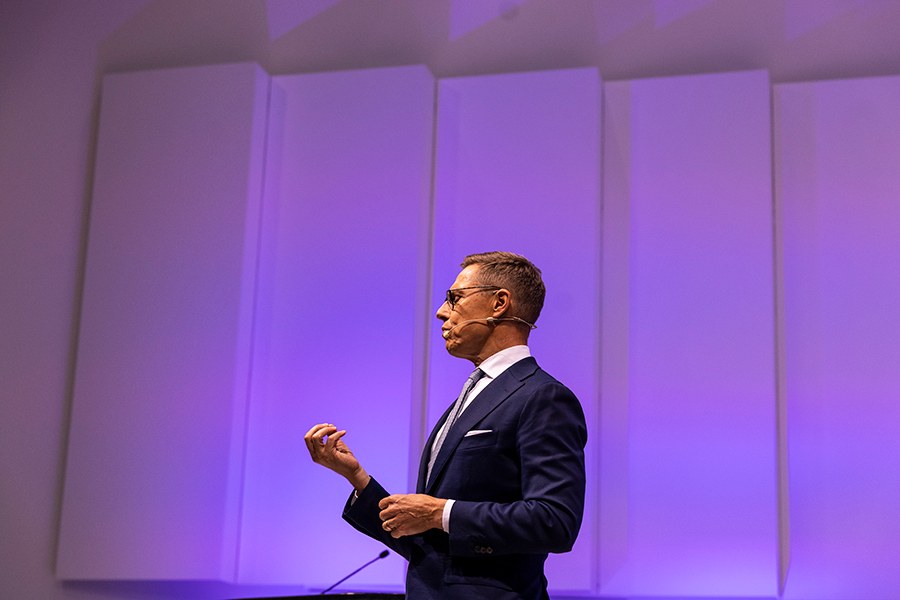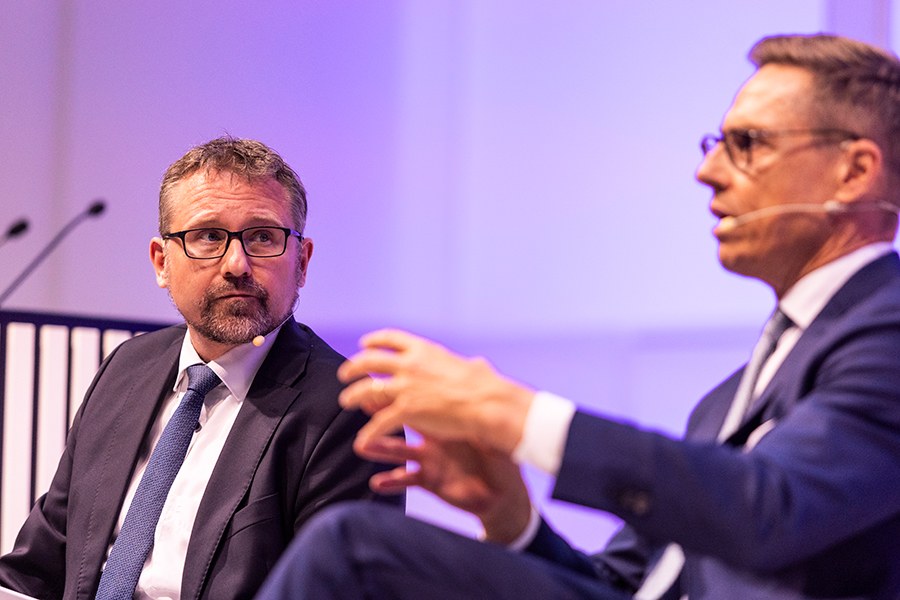President Stubb highlighted the importance of institutions while visiting Tampere University

President Alexander Stubb’s talk on geopolitics and the transformation of the world order took place in the Main Auditorium of the Main Building on the city centre campus. The event began with opening remarks from Keijo Hämäläinen, President of Tampere University, who welcomed President Stubb to the University. The event attracted approximately 500 attendees and was also streamed live by the local newspaper Aamulehti.
President Stubb started his talk with an overview of post-war peace processes, the changing world order and shifts in global power relations.
In the aftermath of World War II, the world was divided into two opposing blocks, with the USA and the Soviet Union emerging as the dominant superpowers in a bipolar world. The year 1989 marked a transition to a unipolar world, with the USA becoming the sole superpower, and all countries were believed to be moving towards the US model.
“In 1989, we believed history had ended and that eternal peace would prevail. At the same time, we became intellectually lazy: we thought we no longer needed institutions and would automatically navigate towards a better world,” Stubb said.
According to Stubb, the 9/11 terrorist attacks in 2001 initiated a gradual change in this balance of power. The 2008 global financial crisis further undermined the credibility of the West, along with the European refugee crisis in 2015. The final blow came with the Russian invasion of Ukraine, which ultimately forced us to see the world from a different perspective and plunged the world into disorder.

The dynamics of competition, conflict and collaboration prevail in our world
In his talk, President Stubb noted that we are now amidst a competition between the Global West, Global East and Global South.
The Global West aims to preserve the current world order and institutions such as the United Nations (UN) and the World Trade Organization (WTO), while China and Russia are pursuing a new world order. The Global South, on the other hand, seeks greater agency and development, striving to forge its own path instead of choosing between democracy and authoritarianism. According to Stubb, the Global South will decide what the new world order will ultimately look like.
Stubb divided the current global dynamics into three parts: competition, conflict and collaboration. We are now witnessing a power struggle between the USA and China. If left unchecked, this rivalry could escalate into conflict. To prevent this, Stubb emphasised the need for collaboration, which can be fostered through efforts in areas such as climate action, artificial intelligence, energy and economics.
Stubb also highlighted the role of the UN, which remains the world’s most important organisation dedicated to maintaining international peace. He finds, however, that the UN should be reformed because it no longer reflects the world we are living in.
According to Stubb, the number of permanent UN members should be increased from the current five to ten to provide greater representation for Asia, Africa and Latin America. He also suggested abolishing the right to veto decisions and introducing the possibility of suspending member countries that violate the UN’s regulations.
Leadership relies on the framework provided by institutions
Following his talk, President Stubb was interviewed by Professor Hiski Haukkala. One of the themes they discussed was the upcoming UN General Assembly, which Stubb will attend next week. A key objective for Stubb at the General Assembly is to convey to the countries of the Global South that Finland is eager to collaborate with them.
Haukkala asked Stubb about the type of leadership needed in today’s world and the role Finland could play in making the world a better place. Stubb responded that Finland is well-positioned for collaboration with many countries because it does not have a history of imperialism or colonialism. Stubb emphasised that he is not looking to see global leadership but rather strong global institutions. He noted that power can have a corrupting effect, and the centralisation of power can lead to an unjust world. Leadership must therefore be contained by institutional boundaries and laws.

President Stubb’s famously coined phrase, “value-based realism”, came up during the interview. Haukkala mentioned that he sees this phrase not as a scientific concept but as a political tool. But how does Stubb use this tool?
“We need to advocate for foreign policy that is based on values that are important to us, such as human rights, fundamental rights and democracy. In this context, realism means acknowledging the fact that global problems cannot be resolved only by working with like-minded countries,” Stubb said.
After answering questions from the audience, Stubb had a message for students. He encouraged students to challenge themselves intellectually and stay open-minded and curious, as our minds close down if we become cynical or dismiss different opinions. He advised students to think, rethink, be wrong and find new solutions – and take occasional breaks from smartphones that ruin our patience and ability to engage in deep thought.
At the beginning of the event, a few students staged a peaceful pro-Palestinian protest in the Main auditorium. President Stubb remained calm and listened to the students’ concerns. The protesters soon left the venue.
Watch a recording of the event on Aamulehti’s website
24.9.2024 8:42 Corrected inaccurate wording 'expelling' to 'suspending'.





